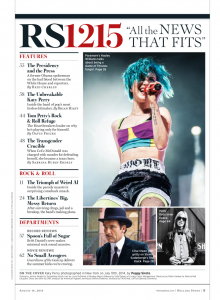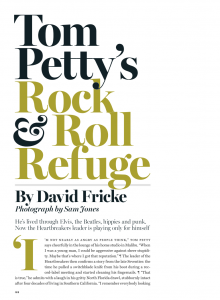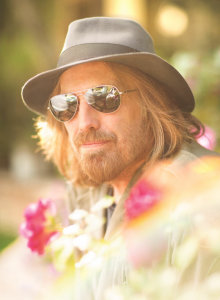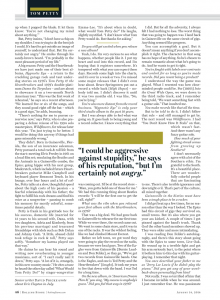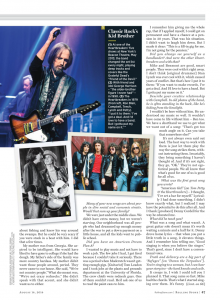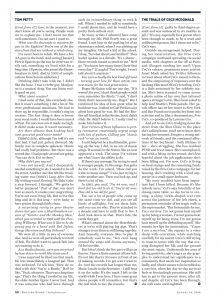Tom Petty's Rock & Roll Refuge
By David Fricke
Rolling Stone #1215 - August 14, 2014
He's lived through Elvis, the Beatles, hippies and punk. Now the Heartbreakers leader is playing only for himself.
"I'm not nearly as angry as people think," Tom Petty says cheerfully in the lounge of his home studio in Malibu. "When I was a young man, I could be aggressive against sheer stupidity. Maybe that's where I got that reputation."
The leader of the Heartbreakers then confirms a story from the late Seventies: the time he pulled a switchblade knife from his boot during a record-label meeting and started cleaning his fingernails.
"That is true," he admis with a laugh in his gritty North Florida drawl, stubbornly intact after four decades of living in Southern California. "I remember everybody looking up when I popped the blade. It let them know: 'You're not changing my mind about anything.'"
But, Petty insists, "I don't have a chip on my shoulder. I was trying to do the best job I could. It's hard to get outside an image of yourself, to understand that. But I'm certainly not angry." He smiles through his sandy-brown beard. "I'm probably in the most pleasant period of my life."
A big reason: Petty and the Heartbreakers have just made one of their best albums, Hypnotic Eye—a return to the crackling garage rock and taut underdog stories on 1976's Tom Petty & the Heartbreakers and 1979's double-platinum Damn the Torpedoes — and are about to showcase it on a two-month North American tour. "This was the first week of rehearsal," he says on a recent afternoon. "We learned five or six of the songs, and they sound good right off the bat—which is a good sign," he adds, beaming.
"There's nothing for me to pursue careerwise now," says Petty, who is also preparing a deluxe reissue of his 1994 solo masterpiece, Wildflowers, for release later this year. "I'm just trying to be better. I would be doing this anyway if things had gone miserably wrong."
They didn't. Born in Gainesville, Florida, the son of an insurance salesman, Petty pursued a total rock & roll life from the start: meeting Elvis Presley in 1961 on a local film set; emulating the Beatles and the Animals in a Gainesville combo, the Epics; going hippie with his next group, Mudcrutch, which includes future Heartbreakers guitarist Mike Campbell and keyboard play Benmont Tench. In his lounge, over four hours and a lot of coffee, Petty talks at a slow, thoughtful speed about the high costs of his passion—a fearful relationship with his father; the fight to fulfill his rock dreams and find his voice as a songwriter—pausing to comb his memory for mostly colorful, sometimes painful details.
Petty is frank in his gratitude too: for his success, domestic life (married for 13 years to his second wife, Dana, with his two daughters, Adria and Kimberly, from his previous marriage) and treasured friendships with idols such as Bob Dylan and Johnny Cash. "A little, abused child took refuge in rock & roll," Petty says softly. "Somehow my karma played out that way."
He claims he can hear his sound and writing now reverberating in younger musicians, sort of. "I can't really nail it down," Petty says. "A lot of it is, strangely, in this new country music." He cites a tune he heard the other day called "What Would Tom Petty Do?" by singer-songwriter Emma-Lee. "It's about when in doubt, what would Tom Petty do?" He laughs, slightly mystified. "I don't know what Tom Petty would do. But thanks for asking."
Do you still get excited when you release a new album?
Yeah, I do. I'm very curious to see what happens, whether people like it. I put my heart and soul into this record, and I'm hoping that it registers somewhere. It's tempered with what you can expect these days. Records come high into the charts, and it's over in a week or two. I've missed some major releases that I didn't even hear about. Bruce Springsteen put out a record a while back [High Hopes]—nobody told me. I didn't discover it until it was two months old. I was like, "No, you're lying."
You're also more distant from the record business. "Hypnotic Eye" is only your third studio album in the past 10 years.
But I was always able to feel what was going on. It goes back to being young and a record collector. I knew everything that was coming out. I'd be at the record store—"Man, you gotta hold one of those for me." We had this running thing about Beatles records: "I will be the first one to get the call, right?"
What was the vibe when you released your first album with the Heartbreakers, in 1976?
That was a big deal. We had gone back to Gainesville to rehearse for our first tour. While we were there, the record came out. We went to some chain store, and it was in one of the racks. It was the wildest feeling, like we had climbed Mount Everest.
Before we left town, we got word they were going to play the record on the radio, because we were local guys. Who of the Eagles were from Gainesville [Bernie Leadon and Don Felder], so they go, "We've got two records from Gainesville bands. One is the Eagles, and one is Ted Petty and the Heartbreakers" [laughs]. It took me years to live that down with the band. I was Ted for a long time.
On the new album, in "American Dream Plan B," you sing, "My success is anybody's guess." Did you feel that way in 1976?
I did. But for all the adversity, I always felt I had nothing to lose. The worst thing that was going to happen was I land back in Gainesville on the same circuit of gigs. Anything seemed like progress.
You can accomplish a goal. But it doesn't mean anything if you don't accomplish it right. The character in that song has no hope of anything. So he's chosen to remain romantic about what he's going to do. And he wants to get it right.
You've fought with labels over contracts and control for as long as you've made records. Did you resent being a product?
I understood the way the game was played. What I resented was how close-minded people could be. For [1991's] Into the Great Wide Open, we were down to the third radio track, and I remember being told, "We want something fast with a guitar solo." That insulted me.
You make records like that all the time.
But to be told to do it. I didn't follow that rule—and still managed to get by. The next record was Wildflowers. I had "You Don't Know How It Feels" on that, which wasn't fast. And there wasn't any fuzzy guitar solo.
How much of your fighting streak comes from growing up Southern?
I don't necessarily agree with a lot of the Southern ethic. I'm grateful to the South. It's a beautiful place. There are wonderfully colorful people that are fascinating to me. There's also terrible ignorance and downright evil. That's part of the culture, all mixed together.
Gainesville in the Sixties must have been a tough place to be a rocker.
I did get beat up a few times, for no reason other than the way I looked. The Epics had this circuit of gigs they survived on, small towns. But it's also where you got your ass kicked. A couple of times I got pinned against the band's truck. Thank God the other band members showed up. They were older and more intimidating.
I was reading Don Felder's autobiography, and there's this story about going with the Epics to some town, Live Oak. He wound up in a terrible fight and got his arm seriously hurt, to the point where it bothers him to this day with his guitar-playing. I remember that night.
You once described your father to me as "Jerry Lee Lewis if he didn't play the piano." Did you get any of your won't-back-down personality from him?
Not really. I was so terrified of him that I became invisible when he was around. I just remember fear. He was passionate about fishing and knew his way around the swamps. But he could be very scary if you were stuck in a boat with him. I did that a few times.
My mother was from Georgia. She aspired to be intelligent. She would have liked to have gone to college if she had the dough. My father's side of the family was more country hardass. My mother didn't want those people around, period. She said, "We're not country people." What she meant was, "We're not crazy rednecks." She didn't speak with that accent, and she didn't want us to either.
Many of your new songs are about people in dire social and economic straits. Would that sum up your family?
We were just under the middle class. We didn't have extra money, but we weren't starving. Our neighborhood was all people who had drummed up enough money after the war to put a down payment on a little house, and all the kids went to public school.
Did you have an American Dream Plan A?
I wanted to play music and not have to work a job. The few jobs I had, I got fired because I couldn't take it seriously. There was a period when Mudcrutch wasn't getting enough gigs. [Guitarist] Tom Leadon and I took jobs at the plants and grounds department at the University of Florida. The crew chiefs were redneck guys. One of them couldn't read. He'd ask one of us to read the paint cans to him.
I remember him giving me the whole rap, that if I applied myself, I could get on permanent and have a chance at pension in 20 years. That was his situation. I didn't want to laugh him down. But I made it clear: "This is a fill-in gig for me. I'm not going for the pension."
Did you always see yourself as a bandleader? And were the other Heartbreakers cool with that?
Mike and Benmont are good, smart people. They were cool with it right away. I don't think [original drummer] Stan Lynch was ever cool with it, which caused years of conflict. But that's how I put it to them: "If you want to make records, I've got a deal. And I'd love to have a band. But I gotta put my name on it."
Describe your creative relationship with Campbell. In old photos of the band, he is often standing in the back, like he's hiding from the limelight.
I wouldn't be here without him. He understood my music so well. It wouldn't have come to life without him—Ben too. We have a shorthand we use to get what we want out of a song: "That's got too much angle on it. Can you take that somewhere else?"
It's not always even said out loud. The best way to work with them is to just let them play the way the song strikes them, without instructing them. Invariably, they bring something I haven't thought of. And if it's not right, they go, "OK." They're not egotistical people. We all know that what's good for one of us is good for all of us.
What was the first great song you wrote?
"American Girl" [on Tom Petty & The Heartbreakers}—I thought, "I've set a bar for myself." Lyrically I had done something. I didn't know exactly what, but I realized I may have the potential to do this after all. And I thank [producer] Denny Cordell for the way he educated me.
What did he teach you?
What was a song and what wasn't. A great guitar solo doesn't mean it's worth waiting a minute and a half for it. Denny drove home lyrics—that when you put a little truth in a song, it elevates things. and I remember him telling me, "Good singing is when you believe the singer." That's good, because I don't have a conventional voice.
Truth and delivery are a big part of "Refugee" [on "Damn the Torpedoes"]. You're singing to a woman, but I can hear your story too—the hard knocks and exile.
It creeps in. I wish I could tell you I planned it. That song came so fast. Mike had the chords. That's what I started singing over them. It's funny how, in the moment, you don't know all you're seeing. People want me to explain me. I don't know me that well sometimes. I'm not sure I want to.
What was the downside to stardom for you in the Eighties? You're one of the few stars from that era without a rehab story.
I've never been to rehab. We have a few AA guys in the band. And seeing [bassist] Howie Epstein go the way he went was really sad, something we lived with for a long time. {Epstein, who joined the Heartbreakers in 1982, died in 2003 of complications from heroin addiction.]
Drinking didn't take with me. I didn't like the buzz. I was a reefer guy. Marijuana is a musical drug. You can listen really good on pot.
What about cocaine?
I had some of that, like everybody else. But it wasn't something I did a lot of. We were professional musicians. We had to show up, be responsible. I couldn't sing on cocaine. The first thing it does is freeze your vocal cords. I would have been scared of that. I'm not even sure it made me high. It didn't make sense. It wasn't necessary.
Are there albums that, looking back now, you wish you'd never made?
[1999's] Echo, although I'm told it's not that bad. I had just gotten divorced. My family was in complete upheaval. Howie had really bad problems. But there was a record due. I had people around me going, "You can do it. Get in there."
Why didn't you say no?
I was not myself. And I desperately needed something to do. I needed to be off the street. another one that felt like treading water was [1982's] Long After Dark. My writing wasn't flowing. We didn't take a step forward. I thought, "We gotta be better prepared." Part of that was don't tour as much. It erodes your songwriting. You're not even living life. But to live this long and do it this long—we're lucky to have gotten through fairly clean.
A surprising rarity in your theater shows last year was a Heartbreakers version of "Tweeter and the Monkey Man," which you recorded in 1988 with the Traveling Wilburys. What was it like to be the young guy in a band with Bob Dylan, George Harrison and Roy Orbison?
We were all a little in awe of everyone else. And we were all particularly reverent of Bob. We didn't want to spook Bob into not wanting to do it.
As a Beatles fanatic, were you surprised by how down-to-earth Harrison was?
I was surprised he liked me that much. He was immediately a hangout pal. That was awkward. I'd tell him, "How do we deal with this? You're a Beatle." He'd be like, "Yeah, whatever. That was a long time ago." That's the thing I needed in my life, the older-brother figure I never had. And it was someone who had been through such an extraordinary thing in rock & roll. When I needed to talk to somebody, I could phone him, and he would have a pretty fresh outlook on it.
So many artists I admired have come through my life. Phil Everly was a great friend. I met him in the parking lot of an elementary school, when I was picking up my daughter. He had a kid at the school. I'd say, "So what about your brother?" They hadn't spoken in a decade. "It's a shame—those records meant so much to me." He'd go, "You know how many times I hear that every day?" [Laughs] "You're right, I won't walk about it anymore."
You were actually the best kind of friend—turning your love for those artists into new music for the next generations.
Roger McGuinn told me one day, "If it weren't for you, I don't think people would even remember the Byrds." I said, "I don't think that's necessarily me, Roger." But I reinforced his idea of how great what he had done was. I talked to Carl Perkins a lot about how great he was. He had the Beatles tell him that in the Sixties, but it didn't stick. He didn't believe it. I really tried to make him believe it.
Your version of these influences is pretty consistent: emotionally urgent songs with lots of guitars. Calling you "classic rock" is not an insult.
I can't help but be a traditionalist, growing up the way I did, in an era of classic songs. It seemed in the Sixties like an icon appeared a week. The songs I've written are what I have the ability to do.
If there's any message I'm trying to send to younger people, it's the songs. You gotta do the work. I'm asked, "How did you write so many songs?" I was just trying to write another one. Then you look up, and there's a lot of 'em.
In 1995, you said, "I'm 44 now, and I don't feel too old to do it." You're 63 now. How old is too old for you?
You see a lot of people who came up the same time we did, and you see all kinds of taillights. You see them fade, and you can see why. They're attached to a decade and have to milk that to live. I don't look down on that. That's fate, the cards they got.
What's unusual about the Heartbreakers is we're still playing big gigs. That's stranger to me that us still being together. And, honestly, everyone likes to play. If somebody said to me, "You can't hang around the amps and drums anymore," I'd feel terrible.
But I don't think the live part will go on forever. I have a finite amount of time left. It's not like there's 20 years in front of me of making records. I've got a lot I want to do. And the records last longer than me. Music I made in the Seventies—I still hear it on the radio. It's the mark I left in the world while I was here. I have some great shows people will remember, but that's the real work in me: the records.

